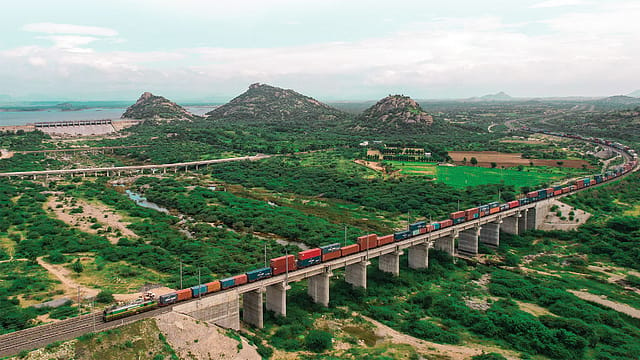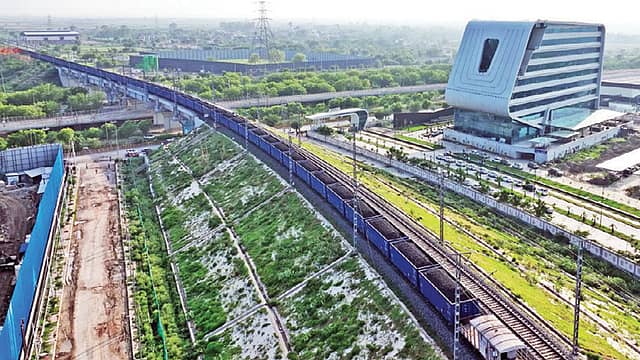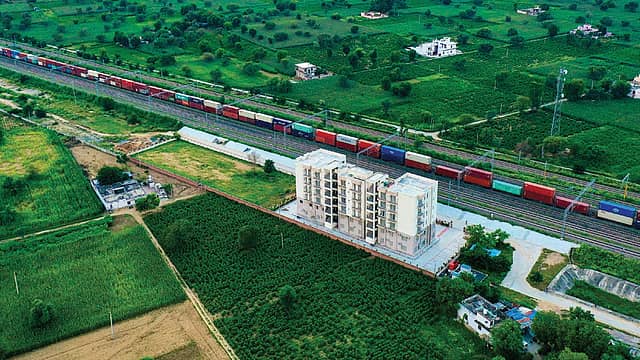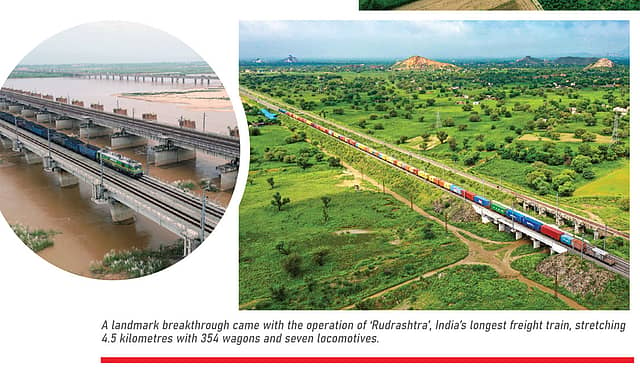DFCCIL: 20 Years Of Fast Tracking India’S Economic Growth

The Dedicated Freight Corridor Corporation of India Limited (DFCCIL), commemorated a significant milestone- 20th Foundation Day on 31st October, 2025 at Bharat Mandapam, New Delhi. The event was a reflection on two decades of remarkable achievements that have redefined India's freight transportation landscape.
A visionary initiative by the Indian Railway's Ministry, the Dedicated Freight Corridors (DFC) to build a sustainable golden quadrilateral linking the four metropolitan cities of Delhi, Mumbai, Chennai and Howrah, and two diagonals Delhi-Chennai and Mumbai-Howrah. The network has decongested rail traffic and accelerated freight movement.
MILESTONE ACHIEVEMENT
On the landmark occasion of the 20th Foundation Day of DFCCIL, Shri Satish Kumar, Chairman and CEO, Railway Board, in his address to the august audience of senior officials from the fraternity of Indian Railways, DFCCIL and stakeholders, proudly highlighted the schedule 'A' Public Sector Undertaking's tremendous operational growth. He asserted that "in 2024-25 alone, DFCCIL recorded a 48% surge in train operations, achieving over three hundred million NTKM per day." This impressive performance, he added, has significantly capable of boosting Indian Railways' modal share in freight transport while significantly reducing national logistics costs, a leap towards a more efficient and sustainable logistics ecosystem. On the historic occasion, DFCCIL also launched a colourful history book titled Revolutionizing Freight Transportation in India - Dedicated Freight Corridors - Vision to Reality.
OPERATIONAL EXCELLENCE
By adopting cutting-edge technology and smart strategies, DFCCIL, empowered its operational efficiency and technological prowess, manifold In FY 2024-25, an average of over 357 freight trains were operated per day, totalling 1,30,116 trains running successfully during the review period. The Gross Tonne Kilometre (GTKM) surged to 1,92,146 million, while the Net Tonne Kilometre (NTKM) stood at 1,11,898 million with steady growth in productivity and reliability being the norm.
BUSINESS AND CONNECTIVITY EXPANSION
DFCCIL has played a pivotal role in enhancing India’s freight connectivity through the development of Gati Shakti Cargo Terminals (GCTs) and Multimodal Logistics Parks (MMLPs). The inauguration of the Gothangam Gati Shakti Cargo Terminal in March 2025, along with the commissioning of terminals at New Daud Khan and New Ankleshwar gave impetus and improved regional logistics flow.

Innovative initiatives such as the ‘Trucks-on-Train’ and ‘High-Speed Small Cargo Service’ have further bolstered first and last-mile connectivity, promoting a shift from road to rail transport. In collaboration with DMIC-IIT-GNL, DFCCIL is also developing the New Dadri Multimodal Logistics Hub, a transformative project expected to enhance industrial linkages and facilitate seamless trade movement across India.
INFRASTRUCTURE AND ENGINEERING EXCELLENCE
DFCCIL’s infrastructure achievements stand as a testament to its engineering excellence.The completion of 37 Road Over Bridges (ROBs), 50 Road Flyovers (RFOs), and 544 Road Under Bridges (RUBs) during FY 2024–25 reflects the organization’s commitment to improving logistics mobility and safety.
Among its major engineering triumphs, the Kalamboli Rail Flyover — featuring a 110.5 metre-long Open Web Steel Girder — remains the longest such structure to date, symbolizing DFCCIL’s technical expertise. Another highlight was the successful breakthrough of the Kundewal Tunnel, which underscored the corporation’s precision in project execution and adherence to deadlines.
Additionally, a recent successful trial run between New Saphale and Indian Railways’ Kharbao station marked the operational readiness of the Vaitarna–Kharbao section, further moving towards completion.
TECHNOLOGICAL INNOVATION AND GLOBAL COLLABORATION
DFCCIL led Indian Railways’ modernization drive by introducing advanced technologies aimed at enhancing safety, reliability, and performance. Cutting-edge systems such as the Machine Vision Inspection System (MVIS), Hot Axle Box Detector (HABD), Wheel Impact Load Detector (WILD), Top-of-Rail Lubrication System, Broken Rail Detection System, Drone-based Inspection Systems, Dedicated Freight Inspection System (DFIS), and New DFCCIL’s innovation Clip Applicator were deployed across the network. These innovations have transformed DFCCIL into a smart, data-driven freight corridor, capable of real-time monitoring and predictive maintenance.

The Global Heavy Haul Seminar 2025 hosted at Bharat Mandapam, New Delhi, saw experts converging from seven heavy-haul railway nations that underscored DFCCIL’s growing global prominence.
To foster research and innovation, DFCCIL has also forged strategic partnerships with leading academic and industry institutions, including Gati Shakti University, IIT Roorkee, LORAM, Plasser, L2M (IISc Bengaluru), and Monash University (Australia). These collaborations are driving advancements in freight technology, safety systems, and sustainable rail logistics.DFCCIL is also a prominent face of India’s railway innovation on global platforms.
Participation in Global Rail 2025 in Abu Dhabi, the 16th International Railway Equipment Exhibition (IREE 2025) in New Delhi, and the Tomorrow Mobility World Congress 2025 at Fira Barcelona, Barcelona are events where DFCCIL showcased India’s achievements in freight corridor development, multimodal integration, and sustainable logistics, reinforcing its role as a global leader in railway modernization.
A KEY PLAYER IN LOGISTICS REVOLUTION
India’s logistics sector, valued at approximately `24 lakh crore, has witnessed a paradigm shift due to DFCCIL’s contributions. The corporation’s corridors have been instrumental in reducing logistics costs from 14% of GDP to around 8–9%, strengthening India’s industrial competitiveness and self-reliance.

A cost comparison clearly illustrates this impact: while rail transport costs `1.96 per tonne-kilometre, road transport stands at `3.78, and water transport at `2.30. DFCCIL’s operations thus ensure a more cost-effective, high-efficiency, and environmentally sustainable logistics ecosystem, a critical enabler of Viksit Bharat.
FUTURE ROAD MAP
DFCCIL symbolises India’s freight transformation— connecting industries, empowering trade, and driving economic growth. With continued focus on innovation, sustainability, and technological integration, the freight giant is not only redefining India’s logistics landscape but also propelling the nation toward a more connected, efficient, and sustainable future in freight transportation for a self-reliant India.